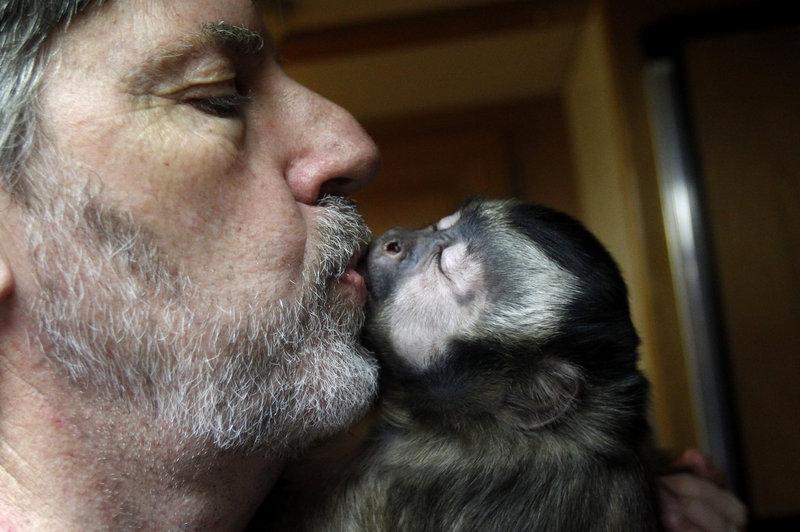NEAR THE TEXAS-LOUISIANA LINE — Even in their Texas hideout, Jim and Donita Clark are terrified that wildlife agents from their home state of Louisiana will descend on their mobile home and seize the four Capuchin monkeys they’ve reared for 10 years.
Four months ago, the couple fled before authorities showed up at their house for an inspection, and ever since they’ve been hiding out with their monkeys – all of them cooped up in a recreational vehicle.
Exotic animal owners like them say wildlife agents have been cracking down in Louisiana and around the country after high-profile cases of exotic animals getting loose or attacking people. At least six states have banned the ownership of wild animals since 2005, and Congress is mulling tighter restrictions.
The couple fears the monkeys will be confiscated and sent to a zoo if they return home to DeRidder, La.
“It’s not what I fought for … to be treated like this,” said Jim Clark, a 60-year-old disabled Vietnam veteran, as tears streaked his face. “It’s not right to think they can come into your house and do this to you with or without a warrant.”
As Clark talked on a recent day, the monkeys looked on from their cages. Hands gripping the cage bars, a couple of the hyper, super-inquisitive furry creatures – capable of lightning-fast vertical leaps – barely moved and cooed softly. The mobile home is a far cry from the DeRidder house that boasts two monkey playrooms and a large outdoor enclosure.
“To take these guys out of their home and throw them in a zoo? It’s like taking a little child out of a mansion and throwing it into the ghetto,” Donita Clark said. “It’s that devastating. It’s destroyed us both emotionally. We’ll never be the same.”
Crackdowns in Louisiana and elsewhere have gained momentum since a man in Ohio released his personal zoo of lions, tigers, zebras, bears and monkeys before killing himself. The 2009 face-mauling of a Connecticut woman by a chimpanzee also highlighted the dangers of keeping wild animals in residential neighborhoods.
“It was a wakeup call to the nation that we should no longer tolerate the reckless decision-making by a small number of people,” said Wayne Pacelle, head of the Humane Society of the United States.
Veterinarians and primate experts generally agree that monkeys – like all wild animals – shouldn’t be adopted as pets.
“They are not animated toys. They’re so intelligent they’re difficult to keep in a stimulated environment long term,” said Dr. Patricia V. Turner, president of the Association of Primate Veterinarians.
She said monkeys kept in homes often end up obese and suffering from emotional stress that takes the form of self-biting. Monkeys are garrulous social creatures and need to be around their own kind, she said.
In Congress, one proposed bill would ban unlicensed professionals from buying, selling or moving primates across state lines. Meanwhile, 24 states now ban the ownership of primates and 11 others require permits, according to the Humane Society. Hundreds of cities and counties also have local bans.
Exotic animal lovers feel like they are under assault.
“So many of us want to disappear, and have our own community where we can safely keep our monkeys,” said Ann Newman, the owner of seven monkeys in Arkansas and the president of the Simian Society of America, a membership group for monkey lovers.
Send questions/comments to the editors.



Success. Please wait for the page to reload. If the page does not reload within 5 seconds, please refresh the page.
Enter your email and password to access comments.
Hi, to comment on stories you must . This profile is in addition to your subscription and website login.
Already have a commenting profile? .
Invalid username/password.
Please check your email to confirm and complete your registration.
Only subscribers are eligible to post comments. Please subscribe or login first for digital access. Here’s why.
Use the form below to reset your password. When you've submitted your account email, we will send an email with a reset code.